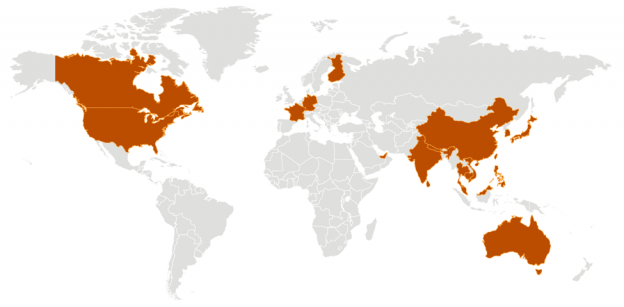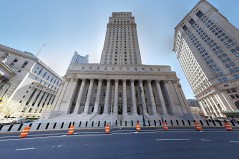The Centers for Disease Control (CDC) is closely monitoring an outbreak of respiratory illness caused by a novel (new) coronavirus (named “2019-nCoV”) that was first detected in Wuhan City, Hubei Province, China and which continues to expand. Chinese health officials have reported thousands of infections with 2019-nCoV in China, with the virus reportedly spreading from person-to-person in many parts of that country. Infections with 2019-nCoV, most of them associated with travel from Wuhan, also are being reported in a growing number of international locations, including the United States. The United States reported the first confirmed instance of person-to-person spread with this virus on January 30, 2020.
Coronaviruses are a large family of viruses that are common in many different species of animals, including camels, cattle, cats, and bats. Rarely, animal coronaviruses can infect people and then spread between people such as with MERS and SARS.
Source and Spread of the Virus
Chinese health authorities were the first to post the full genome of the 2019-nCoV in GenBankexternal icon, the NIH genetic sequence database, and in the Global Initiative on Sharing All Influenza Data (GISAIDexternal icon) portal, an action which has facilitated detection of this virus. CDC is posting the full genome of the 2019-nCoV viruses detected in U.S. patients to GenBank as sequencing is completed.
2019-nCoV is a betacoronavirus, like MERS and SARs, all of which have their origins in bats. The sequences from U.S. patients are similar to the one that China initially posted, suggesting a likely single, recent emergence of this virus from an animal reservoir.
Early on, many of the patients in the outbreak of respiratory illness caused by 2019-nCov in Wuhan, China had some link to a large seafood and live animal market, suggesting animal-to-person spread. Later, a growing number of patients reportedly did not have exposure to animal markets, indicating person-to-person spread. Chinese officials report that sustained person-to-person spread in the community is occurring in China. Learn what is known about the spread of newly emerged coronaviruses.
Situation in U.S.
Imported cases of 2019-nCoV infection in people have been detected in the U.S. While person-to-person spread among close contacts has been detected with this virus, at this time this virus is NOT currently spreading in the community in the United States.
Key Points
- CDC recommends that travelers avoid all nonessential travel to China.
- There is an ongoing outbreak of respiratory illness caused
by a novel (new) coronavirus that can be spread from person to person.
- Chinese officials have closed transport within and out of Wuhan and other cities in Hubei province, including buses, subways, trains, and the international airport. Other locations may be affected.
- Older adults and people with underlying health conditions may be at increased risk for severe disease.
- The situation is evolving. This notice will be updated as more information becomes available.
More Information
What is the current situation?
- CDC recommends that travelers avoid all nonessential travel to China. In response to anoutbreak of respiratory illness, Chinese officials have closed transport within and out of Wuhan and other cities in Hubei province, including buses, subways, trains, and the international airport. Additional restrictions and cancellations of events may occur.
- There is limited access to adequate medical care in affected areas.
A novel (new) coronavirus is causing an outbreak of respiratory illness that began in the city of Wuhan, Hubei Province, China. This outbreak began in early December 2019 and continues to grow. Initially, some patients were linked to the Wuhan South China Seafood City (also called the South China Seafood Wholesale Market and the Hua Nan Seafood Market).
Chinese health officials have reported thousands of cases in China and severe illness has been reported, including deaths. Cases have also been identified in travelers to other countries, including the United States. Person-to-person spread is occurring in China. The extent of person-to-person spread outside of China is unclear at this time.
Coronaviruses are a large family of viruses. There are several known coronaviruses that infect people and usually only cause mild respiratory disease, such as the common cold. However, at least two previously identified coronaviruses have caused severe disease — severe acute respiratory syndrome (SARS) coronavirus and Middle East respiratory syndrome (MERS) coronavirus.
Signs and symptoms of this illness include fever, cough, and difficulty breathing. This novel coronavirus has the potential to cause severe disease and death. Available information suggests that older adults and people with underlying health conditions or compromised immune systems may be at increased risk of severe disease.
In response to this outbreak, Chinese officials are screening travelers leaving some cities in China. Several countries and territories throughout the world are reported to have implemented health screening of travelers arriving from China.
On arrival to the United States, travelers from China may be asked questions to determine if they need to undergo health screening. Travelers with signs and symptoms of illness (fever, cough, or difficulty breathing) will have an additional health assessment.
What can travelers do to protect themselves and others?
CDC recommends avoiding nonessential travel to China. If you must travel:
- Avoid contact with sick people.
- Discuss travel to China with your healthcare provider. Older adults and travelers with underlying health issues may be at risk for more severe disease.
- Avoid animals (alive or dead), animal markets, and products that come from animals (such as uncooked meat).
- Wash hands often with soap and water for at least 20 seconds. Use an alcohol-based hand sanitizer if soap and water are not available.
If you were in China in the last 14 days and feel sick with fever, cough, or difficulty breathing, you should:
- Seek medical care right away. Before you go to a doctor’s office or emergency room, call ahead and tell them about your recent travel and your symptoms.
- Avoid contact with others.
- Not travel while sick.
- Cover your mouth and nose with a tissue or your sleeve (not your hands) when coughing or sneezing.
- Wash hands often with soap and water for at least 20 seconds. Use an alcohol-based hand sanitizer if soap and water are not available.
Clinician Information
Healthcare providers should obtain a detailed travel history for patients with fever and respiratory symptoms. For patients with these symptoms who were in China on or after December 1, 2019, and had onset of illness within 2 weeks of leaving, consider the novel coronavirus and notify infection control personnel and your local health department immediately.
Although routes of transmission have yet to be definitively determined, CDC recommends a cautious approach to interacting with patients under investigation. Ask such patients to wear a surgical mask as soon as they are identified. Conduct their evaluation in a private room with the door closed, ideally an airborne infection isolation room, if available. Personnel entering the room should use standard precautions, contact precautions, and airborne precautions, and use eye protection (goggles or a face shield). For additional infection control guidance, visit CDC’s Infection Control webpage.
Illustration: location of known cases of the Coronavirus (CDC)









